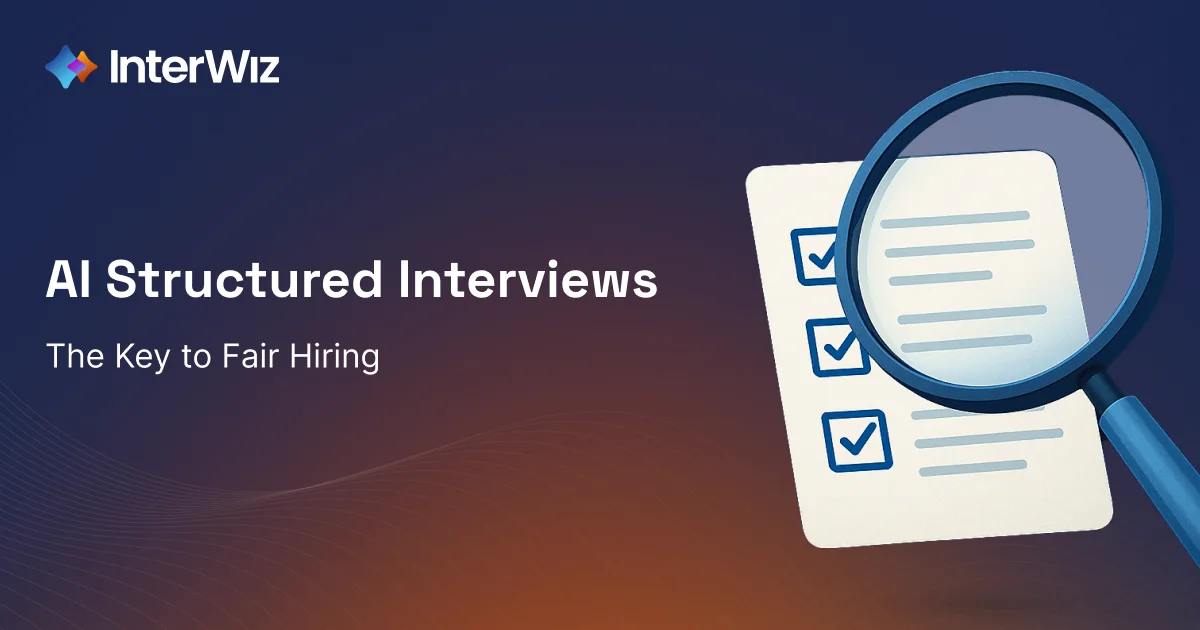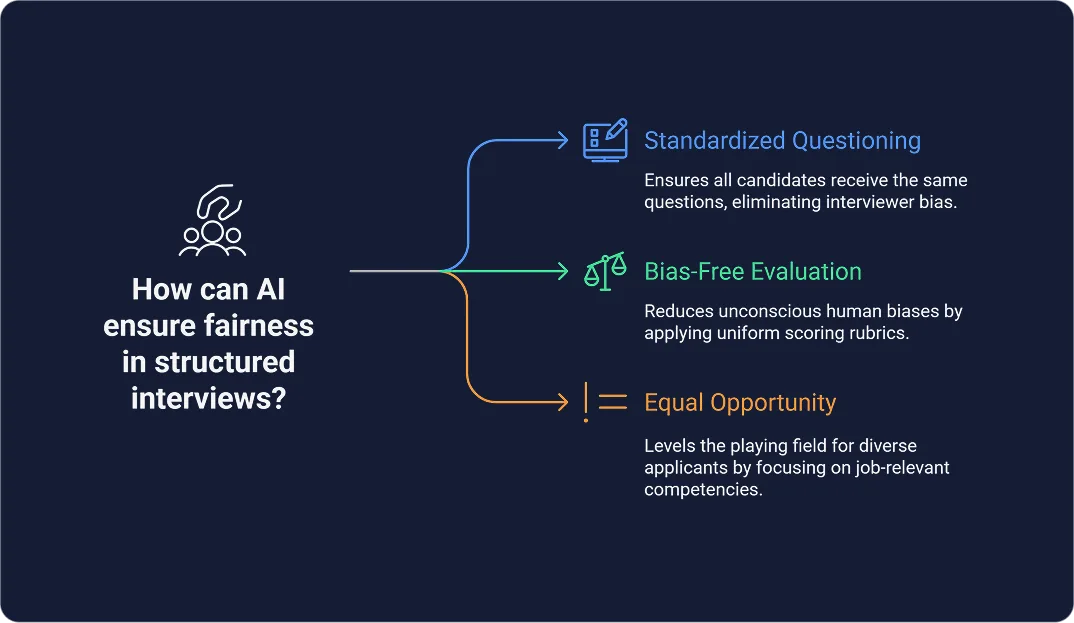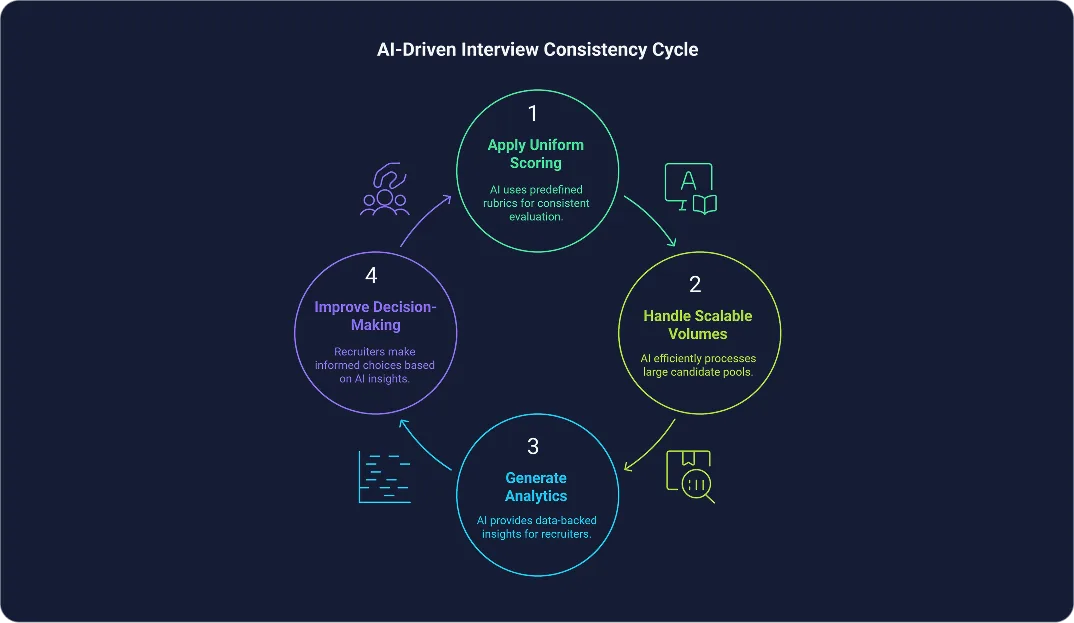AI-Led Interviews | Data-Driven Hiring
How AI Structured Interviews Improve Fairness and Consistency in Hiring

Hiring often fails not because of a lack of talent, but because interviews are inconsistent and biased. Research shows structured interviews predict job success twice as effectively as unstructured ones (Journal of Applied Psychology).
AI takes this proven method further. Interview platforms deliver the same core questions to every candidate, capture behavioral and situational responses, and apply predefined scoring rubrics to reduce bias. The result: fairer, more consistent, and data-driven hiring decisions.
For HR professionals, recruiters, and staffing agencies, this shift is more than compliance. It protects talent pipelines, reduces costly turnover, strengthens diversity, and shows candidates that your hiring process is equitable from the very first interaction.
In this article, we’ll break down what AI structured interviews are, why fairness and consistency matter, how leading companies use them, and the steps to implement them responsibly.
What Are AI Structured Interviews?
A structured interview is a hiring method where every candidate is asked the same set of questions, in the same order, and evaluated against predefined scoring rubrics. Decades of research show structured interviews are significantly more predictive of job performance than unstructured interviews (Journal of Applied Psychology, 2016).
AI strengthens this method by enforcing rigor at scale. Instead of relying on interviewer discipline, AI interview platforms:
Deliver identical questions to every candidate.
Record and transcribe responses for later review.
Score answers consistently against role-specific benchmarks.
For example, a recruiter hiring software engineers might configure the AI system to present the same coding challenge to all applicants. The platform then applies uniform scoring weightage, such as 70% technical accuracy and 30% problem-solving approach, across every response.
Why Fairness and Consistency Matter in Hiring
Inconsistent interviews aren’t just unprofessional, they’re expensive. When interviewers ask different questions or apply subjective judgments, organizations face three major risks:
Overlooked talent: High-potential candidates are often rejected when selection relies on intuition instead of structured evaluation (Campion et al., 1997).
Costly turnover: Replacing an employee can cost up to 200% of their salary when factoring in lost productivity, rehiring, and retraining (SHRM). Many of these mismatches stem from poor-fit hires made through inconsistent processes.
Legal and reputational exposure: In the U.S. and Europe, inconsistent interviewing increases the risk of discrimination claims under EEOC and GDPR standards, undermining employer trust and brand credibility.
By contrast, structured and consistent processes protect organizations on all three fronts. Every candidate is evaluated by the same criteria, reducing subjectivity and ensuring compliance. Just as importantly, fairness builds trust with applicants, many of whom now expect transparent, equitable hiring practices.
How AI Structured Interviews Ensure Fairness
AI strengthens structured interviews by making fairness a repeatable standard rather than a best-effort goal. Three mechanisms are especially important:

1. Standardized Questioning
AI guarantees that every candidate receives the same core questions in the same sequence, eliminating variations caused by different interviewers. Follow-up questions can differ to probe for clarification, but the main prompts remain identical across applicants. For example, candidates for a customer support role might all face the same behavioral question: “Describe a time you de-escalated a difficult client situation.” This structure ensures comparability while allowing flexibility for deeper exploration (Journal of Applied Psychology, 2016).
2. Bias-Free Evaluation
Humans unconsciously weigh factors such as gender, accent, or body language. AI interviewer reduces this by applying uniform scoring rubrics. Algorithms are trained to focus on job-relevant competencies (e.g., technical accuracy, situational judgment) and flag biased patterns if they appear in evaluations. While AI must be audited to prevent algorithmic bias, structured AI scoring has been shown to increase fairness in selection outcomes (Harvard Business Review, 2019).
3. Equal Opportunity Across Backgrounds
By standardizing both delivery and scoring, AI levels the playing field for diverse applicants. For example, non-native English speakers aren’t penalized for minor linguistic differences if the platform evaluates their problem-solving process rather than their accent. Companies reported a 16% increase in diverse hires after implementing AI-based structured interviews (ResearchGate).
How AI-Structured Interviews Drive Consistency
Fairness addresses bias, but consistency ensures reliability. Even the best-trained interviewers can drift in scoring when fatigued or when interview volumes spike. AI eliminates that drift by applying the same rules every time.

1. Uniform Scoring & Weightage
AI applies predefined scoring rubrics with mathematical precision. If a role specifies 60% technical skill and 40% soft skills, those weightings are applied consistently to every candidate. This prevents individual interviewers from overvaluing charisma in one interview and technical ability in another.
2. Scalable Volume Handling
Human evaluators struggle to maintain consistency when interviewing dozens of candidates in a week. AI interview platforms, however, can process hundreds or thousands of applicants with the same level of accuracy, ensuring large candidate pools are assessed without sacrificing rigor.
3. Analytics for Recruiters
AI interview platforms generate dashboards and comparative reports, allowing recruiters to see candidates ranked against identical benchmarks. This side-by-side view improves decision-making by anchoring choices to structured, data-backed evidence rather than scattered notes.
Real-World Applications & Case Studies
AI interviews are not just theory, they’re being used at scale by leading organizations to solve fairness and consistency challenges.
Unilever: By combining AI-led video interviews with gamified assessments, Unilever reduced its hiring cycle by 75–90% and achieved a 16% increase in diverse hires (Harvard Business Review, 2019; HR Executive, 2018). Candidates received identical structured prompts, and AI applied consistent evaluation across a global applicant pool of 250,000.
Hilton: Hilton implemented AI interview platforms to streamline early-stage screening and scheduling. The result was significant time and cost savings, along with a consistent candidate experience across regions (HR Dive, 2018; Business Insider, 2019).
Hudson RPO: This global recruitment process outsourcing firm adopted AI-powered structured interviews to handle thousands of candidates efficiently. By standardizing questioning and scoring, Hudson RPO ensured every applicant was assessed fairly while maintaining the speed and scalability required in high-volume hiring.
InterWiz Example: InterWiz enables recruiters to assign weightage to skills, run bias-free assessments, and generate detailed candidate reports. Unlike traditional platforms, it ensures both technical and soft skills are evaluated consistently, reducing turnover and giving recruiters confidence in data-backed decisions.
How to Implement AI Structured Interviews
Adopting AI structured interviews is less about replacing people and more about embedding fairness and consistency into your hiring process. A step-by-step approach ensures smooth integration and better outcomes.
Define Role-Specific Competencies: Start by identifying the exact skills, behaviors, and cultural values required for the role. Without clear competencies, even the best AI cannot ensure fair assessments.
Select an AI Interview Platform: Evaluate solutions based on scalability, customization, compliance with data protection laws (GDPR in Europe, EEOC in the U.S.), and the types of assessments available, such as coding tests, behavioral, and situational questions, to ensure a well-rounded candidate evaluation. Consider platforms like InterWiz, HireVue, or Sapia, depending on your hiring volume and needs.
Customize Structured Templates: Set up role-specific interview templates with standardized questions aligned to the role. AI can deliver coding tests, behavioral prompts, or situational scenarios consistently across all candidates.
Pilot with a Small Candidate Pool: Run a controlled pilot with 10–20 candidates. Gather recruiter feedback, monitor AI scoring consistency, and check candidate sentiment to ensure the process is both fair and user-friendly.
Train Recruiters and Hiring Managers: AI provides data-driven insights, but human interpretation is still critical. Train hiring teams to read analytics dashboards, interpret transcripts, and combine AI results with final human judgment.
Audit and Optimize Continuously: Conduct regular bias audits to ensure algorithms aren’t disadvantaging specific groups. Adjust question banks, scoring rubrics, or weighting criteria based on outcomes and compliance checks.
Compliance Note: Both EEOC (U.S.) and GDPR (Europe) require transparency in automated decision-making. Always disclose to candidates that AI is used, explain what it evaluates, and ensure humans remain involved in final hiring decisions.
Also read: Using AI for Job Interviews: How It Works, Benefits, and What to Watch For
Ethical & Strategic Considerations
AI structured interviews can improve fairness, but they also raise ethical responsibilities. Organizations that adopt them must prioritize transparency, compliance, and human oversight to avoid undermining trust.
Transparency with Candidates
Candidates should know when AI is used in their evaluation. Research shows applicants are more accepting of AI-driven interviews when employers explain its purpose, reducing bias, ensuring consistency, and speeding up decisions (SHRM, 2022). Clear communication builds trust and improves candidate experience.
Regular Bias Audits
AI is only as fair as its training data. If algorithms inherit historical bias, they can unintentionally disadvantage certain groups. The EEOC in the U.S. and GDPR in Europe both require that automated decision-making be explainable and auditable. Regular audits of scoring outcomes are essential to prove compliance and fairness.
Human + AI Partnership
The most effective hiring models use AI for objective standardization and humans for context and judgment. For example, AI can shortlist candidates with consistent scoring, while recruiters and managers conduct final interviews to assess cultural fit. This “HI + AI” (Human Intelligence + Artificial Intelligence) model balances efficiency with empathy.
Strategic takeaway: Organizations that pair AI’s precision with ethical oversight don’t just reduce bias, they build stronger employer brands and avoid regulatory risk. Candidates increasingly judge employers on fairness; AI structured interviews can strengthen that reputation when used responsibly.
FAQs about AI Structured Interviews
Do AI structured interviews eliminate bias completely?
Not entirely. AI reduces human subjectivity by enforcing standardized scoring, but algorithms must be regularly audited to prevent replicating historical bias (EEOC, 2023).
How do candidates typically react to AI-led interviews?
Studies show candidates are generally receptive if employers explain that AI ensures fairness, consistency, and faster decisions (SHRM, 2022). Transparency is key to trust.
Which industries benefit most from AI structured interviews?
High-volume hiring industries such as technology, staffing agencies, and hospitality see the greatest gains. Global enterprises like Unilever and Hilton report faster cycles and more diverse hires after implementation.
Can recruiters override AI scores?
Yes. Best-practice models keep humans in the loop. Recruiters review AI-generated insights alongside interview transcripts and candidate data before making final decisions.

High Quality Screening with AI Interviews
Automated interviews built for speed, scale, and accuracy.
🔥 Full features, no credit card required.